| From CNN.com:~~~~~~~~ |
Story highlights
- Obama had spoken out forcefully in favor of the UK remaining part of the 28-member EU
- Biden acknowledged White House disappointment at the result Friday
Washington (CNN)Britain's
vote to leave the European Union Friday left the United States
confronting a threat to the strength and cohesion of both its closest
historical ally and a 70-year transatlantic partnership that has been
the bedrock of Western peace and prosperity.
The
outcome of Britain's referendum instantly pitched an already weakened
Europe into a new crisis, opening the possibility that other member
states could choose to leave the E.U. and create new headaches for
Washington.
American leaders on all
sides of the political aisle Friday expressed respect for the decision
of British voters and vowed to stand with America's "special
relationship" ally Britain and the diminished European Union once both
partners have finalized their divorce -- a period that could take years.
But
there was no hiding the concern behind the scenes as the shockwaves
rippled through the EU, a body that has been vital to American foreign
policy initiatives in recent times, including the drive to a nuclear
deal with Iran and attempts to punish Russia for its incursion in
Ukraine.
UK referendum: Full coverage
- Why do the Brits want out?
- How Europe should respond
- Why the U.S. is freaked out
- Does this mean Trump will win?
- Results map tells a big story
- Could this man be next UK PM?
- Anger in bedroom, joy on streets
- Reasons why Brexit could be good
- Could Scottish independence be next?
- Britain voted 'Leave,' what's next?
- What will Brexit mean to me?
- World markets in crisis after Brexit
President
Barack Obama, who felt strongly enough about a British exit or "Brexit"
to travel to Britain in April to warn it could not expect special
treatment on reaching a free trade deal with the U.S. if it left Europe,
offered a rote assurance that nothing would actually change between
London and Washington.
"While the
UK's relationship with the EU will change, one thing that will not
change is the special relationship that exists between our two nations,"
Obama said during remarks at Stanford University in Palo Alto,
California. "That will endure."
But
Sir Peter Westmacott, until earlier this year Britain's ambassador in
Washington, contradicted the idea that nothing would change in the
U.S-British relationship.
"I
feel very sad," Westmacott told CNN's Christiane Amanpour, adding that
Britain after Brexit would be "less influential in the world, in the
European Union, in NATO and the Security Council and a less significant
ally for the United States and many others."
"I
think we are going to have to paddle even harder with our diplomacy ...
to ensure that we continue to ensure that we have our place at the
table."
Vice President Joe Biden,
the administration's less-filtered voice, was more clear about White
House disappointment at the result when he spoke to the issue on a trip
to Ireland Friday.
"I must say we had looked for a different outcome," he said in Dublin. "We preferred a different outcome."
For
the United States, the possibility that the populist, isolationist
victory of the "Leave" vote translates into broader political victories
for the movement in Britain and elsewhere in Europe, could mean
Washington could eventually find itself straining to get help it has
relied on from allies. The UK vote has triggered calls for similar
referendums in France, Sweden and the Netherlands, while populist
governments already hold power in Greece, Poland and Hungary.
If
the Brexit vote results in a domino-like ripple of similar votes or
political victories, the experiment of a united Europe could come to an
end. It would make the continent less able to help the U.S. push back
against Russian assertiveness along Europe's eastern seam, analysts
said.
The United States has
traditionally relied on an engaged Britain, alongside other allies
Germany and France, as a way to ensure its interests are taken into
account on the top table of Europe -- and now faces the prospect of one
of its most influential allies leaving the block and diminishing its
clout.
For
the UK, it's not just the EU exit that could cause Britain's influence
to wane. If Europhile Scotland now holds a second independence vote, the
power of Washington's old ally could be further splintered.
Britain
has been a traditional U.S. partner on efforts to stabilize Afghanistan
and cooperate in the Middle East on issues ranging from Iran's nuclear
program to Israeli-Palestinian peace and the scourge of ISIS. One
outcome of the Brexit vote could be "less help from the UK and other
NATO allies in the Middle East and elsewhere," said Daniel Serwer,
director of the Conflict Management Program at the Johns Hopkins School
of Advanced International Studies.
In
the short term, a distracted UK, led by a lame duck leader following
Cameron's decision to step down, might not have the same capacity or
inclination to take on global challenges.
And
the economic hit the UK will take as it extricates itself from a market
that accounts for 44% of its exports could leave it with fewer
resources to do its share. The U.S. is itself already feeling the
aftershocks -- American stocks were down more than 600 points at the
closing bell Friday afternoon.
Altogether,
that could mean a smaller Britain, less able to meet its defense
commitments, and it would pose problems for the future of the U.K.'s
independent nuclear deterrent, which is based in Scotland and is opposed
by the ruling Scottish Nationalist Party.
It
could also deepen the U.S. perception that took root under the Obama
administration that the U.S. "interests lie more in Asia than in its
traditional Atlantic sphere of influence," according to Sebastian
Mallaby, a senior fellow at the Council on Foreign Relations, writing in
The Washington Post.
Still, American political figures stressed their commitment to the UK despite the change.
House
Speaker Paul Ryan, a Wisconsin Republican, tweeted that "the UK is an
indispensable ally of the US, and that special relationship is
unaffected by this vote."
Sen.
Richard Burr, the North Carolina Republican chairman of the Senate
intelligence committee, said that "while there will be a great deal of
discussion in the coming days and weeks about what the 'Leave' win means
for them and for us, our friends and allies in the UK should know this:
we respect their decision, and we stand by them, just as they have
always stood by us."

Foreign policy: Where Obama and Trump can sound similar 01:38
The
President spoke with British Prime Minister David Cameron and German
Chancellor Angela Merkel on Friday to convey the U.S. commitment to both
of them, saying afterwards that the EU will remain a "vital" U.S.
partner, alongside NATO.
"Our
shared values including our commitment to democracy and pluralism ...
will continue to unite all of us," Obama said, repeating a common theme
in his addresses as criticism of immigrants and religious minorities has
featured in the presidential campaign.
But the administration is also looking to adjust to the new reality.
"What
was said was we believed in a strong UK voice in a strong EU and that
was our position in advance of the referendum," said State Department
spokesman John Kirby. "The people of Great Britain have spoken and they
want the UK out of the EU that's beyond dispute, and so we now have to
move on."
Amid the widespread shock at Britain's decision, Washington is beginning to size up the implications.
"For sure," said Deputy Secretary of State Tony Blinken Friday, "it's going to be a complicated process."
CNN's Kevin Liptak and Jeremy Diamond contributed to this report.
By Nicole Gaouette and Stephen Collinson, CNN
Updated 0829 GMT (1629 HKT) June 25, 2016
********************************************** BUT, on the other hand, DONALD TRUMP is exulting:~~~~~~~~ Trump on Brexit: America is nextStory highlights
Washington (CNN)British
voters just shattered political convention in a stunning repudiation of
the ruling establishment. Donald Trump is betting America is about to
do the same.
Voters in the UK
did more than reject the European Union and topple their pro-EU Prime
Minister David Cameron in a referendum Thursday.
UK referendum: Full coverage
They
also set off a cascade of events that could spark global economic
chaos, remake the Western world, reverberate through November's
presidential election and challenge U.S. security for years to come.
The
referendum campaign -- just like the U.S. election -- has boiled with
populist anger, fear-mongering by politicians, hostility towards distant
political elites and resurgent nationalism, and exposed a visceral
feeling in the electorate that ordinary voters have lost control of the
politics that shape their own lives. Its success raises the question of
whether those forces will exert a similar influence in America in
November.

The
presumptive Republican presidential nominee, who arrived in the UK to
visit his Scottish golf courses just as the referendum result was
announced, declared Friday that the U.S. is next.
"Come November, the American
people will have the chance to re-declare their independence. Americans
will have a chance to vote for trade, immigration and foreign policies
that put our citizens first," he said. "They will have the chance to
reject today's rule by the global elite, and to embrace real change that
delivers a government of, by and for the people."
Indeed,
British voters delivered the kind of crushing rejection of the
political, business and media elites that Trump has been railing
against.
The Brits also snubbed
President Barack Obama's warnings against voting to leave Europe and
risked triggering a global recession that would weaken already sluggish
U.S. economic growth and dampen the hopes of his chosen successor,
Hillary Clinton.
In her first
reaction to the news from Britain, Clinton immediately took a swipe at
Trump, though not by name. She called for Americans to respond to the
vote by pulling together "to solve our challenges as a country, not tear
each other down."
Clinton also
noted the global economic risks of the UK referendum, saying in a
statement: "Our first task has to be to make sure that the economic
uncertainty created by these events does not hurt working families here
in America."
In a particularly striking
development, UK voters completely disregarded warnings from elite voices
of the consequences of tearing the political system that has largely
delivered peace and prosperity since World War II.
Similar warnings have been
heard in the U.S. election -- especially from Clinton and establishment
politicians who fear Trump's "America First" stance would send
shockwaves through the global system and see America pull back from its
role as a guarantor of Western security.
But
in the UK this week, outsider politicians seem to have carried just as
much weight with many British voters as more conventional fact-based
arguments. World authorities like the IMF for example warned about the
consequences of a Brexit -- but voters went ahead and voted to leave
anyway.
Speaking
to CNN, former British Prime Minister Tony Blair described the Brexit
result as a "big experiment in insurgent politics."
He
said the centre-left and centre-right needed to "rediscover radical,
powerful answers in a climate driven by anger ... a revolt against what
is seen as established wisdom, but what is actually people making
difficult decisions in difficult circumstances."
There are, of course, several key differences between the British referendum and America's looming election.
The
UK vote was mostly about delivering a stunning and final blow to the
country's long and reluctant marriage with Europe and turned on a host
of local factors including extreme Euro-skepticism within the governing
Conservative Party, distrust of European politicians and institutions
and disenchantment with Britain's reduced place in the world.
But
in a larger symbolic sense, the referendum result, narrow as it was --
52% to 48% -- demonstrated the potential of voters to wield a stunning
shock to the political system that can shatter the logic and assumptions
of conventional politics.
There's
no guarantee that American voters will show the same kind of
rebelliousness and willingness to leap into the unknown in November as a
slim majority of Britons did on Thursday. And the U.S. system of
state-by-state races and an electoral college could mitigate against
some of the grassroots anger that exploded in a binary "Leave" or
"Remain" vote in Britain.
But events in Europe must trigger at least some concern among Democrats.
Pollsters
in the UK underestimated the fury of grassroots voters outside
metropolitan areas in a way that could be mirrored in the United States,
where Clinton now enjoys a lead in national surveys.
Furthermore,
"Brexit" forces triumphed partly because the Labour Party could not
deliver its traditional working class voters in some big post-industrial
cities for the "Remain" campaign, despite the support of party leaders.

Photos: UK votes to leave EU: How politicians have reacted
             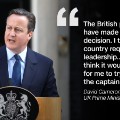 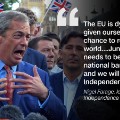    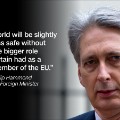 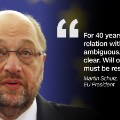 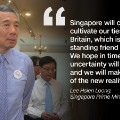
It
is not a stretch to wonder whether the kind of political message that
was so powerful in the referendum -- featuring a harsh critique of free
trade and a demands to "take our country back" -- could prove just as
effective among blue-collar workers in rust belt states in the United
States.
Certainly, it's a message
that Trump has been hammering with success all election season and is at
the center of his claims to be able to remake the U.S. electoral map.
And the billionaire has consistently bested Clinton when voters are
asked who is best equipped to handle the economy.
The
immediate stock market contagion unleashed by the referendum across the
globe represented the worst equity carnage since the start of the Great
Recession in 2008.
If the losses prove short-lived, the impact of the referendum on the U.S. economy and politics could be temporary.
But
if "Brexit" ushers in a period of economic volatility across Europe
that begins to squelch growth, the U.S. economy could be badly affected
-- complicating Clinton's bid to pull off the tough assignment of
winning a third consecutive White House term for the Democrats.
Trump
would meanwhile seize on any slowdown in the U.S. precipitated by
Brexit to argue that Obama's economic management is a failure and it is
time to try something new.
But there are also warning signs for Trump.
Though
he was quick to claim a share of the credit for the British political
earthquake -- placing it in the context of a revolt against global
elites in which he sees himself as a major player -- a prolonged period
of world turmoil could also work against the billionaire former reality
star.
Such an environment could
bolster Clinton's claims that a crisis is no time to choose a president
who has no experience of governing and that her pedigree as a former
secretary of state and relationships with leaders all over the world are
a perfect fit for a perilous moment.
The
Democratic presumptive nominee made that argument in her statement:
"This time of uncertainty only underscores the need for calm, steady,
experienced leadership in the White House to protect Americans'
pocketbooks and livelihoods, to support our friends and allies, to stand
up to our adversaries, and to defend our interests."
Her
campaign later issued a fundraising appeal with that message, writing,
"No matter what the collective wisdom of our political punditry has to
say between now and November, Donald Trump has a real chance of winning
this election."
Clinton's campaign
worked hard to demonstrate a contrast between Clinton and Trump as
potential leaders in a time of crisis. The Clinton camp also sought to
downplay similarities between the seething political scenes in the U.K.
and the United States.
"It is
important that we recognize that this American election is about what is
happening here in America not what is happening in Yorkshire or in
Cardiff," said Clinton's senior adviser Jake Sullivan on a conference
call.
Sullivan also rejected the
idea that Clinton could find herself overtaken by a similar populist
tide in November, saying she had spent months on the campaign trail and
was intimately familiar with the difficulties facing many working
Americans.
The
possible economic consequences of Brexit in the short-term could be
dwarfed by the geopolitical shakeup that is now looming in the years to
come.
Britain's referendum has
already set off calls in Europe for similar separation votes in other
Eurosceptic nations, threatening to dismantle the economic and political
union that has been a pillar of transatlantic stability for 70 years
and been a crucial partner for the United States.
As
the U.S. faces challenges to its power in Asia from a rising China and
in Europe from a recalcitrant Russia and in the Middle East from a
motley group of insurgent forces, Washington can hardly afford the
splintering of its co-guarantor of Western security.
In
addition, the referendum looks likely to result in the fracturing of
America's closest historic ally, the United Kingdom -- a factor that
could be a diplomatic nightmare for the next president.
In the hours after the vote, Scotland's First Minister Nicola Sturgeon announced plans to draft new legislation
to allow a second independence referendum north of the border after
pro-EU Scots narrowly voted to stay in the United Kingdom in 2014.
Though
a Scottish referendum may not take place for years, it will revive
questions about a neutering of British military power and the fate of
Britain's Scotland-based nuclear deterrent -- which nationalists opposed
and is part of NATO's security infrastructure -- that the next U.S.
president will be forced to grapple with.
|







1 comment:
YoBit lets you to claim FREE CRYPTO-COINS from over 100 different crypto-currencies, you complete a captcha once and claim as much as coins you want from the available offers.
After you make about 20-30 claims, you complete the captcha and keep claiming.
You can click CLAIM as many times as 30 times per one captcha.
The coins will stored in your account, and you can exchange them to Bitcoins or USD.
Post a Comment